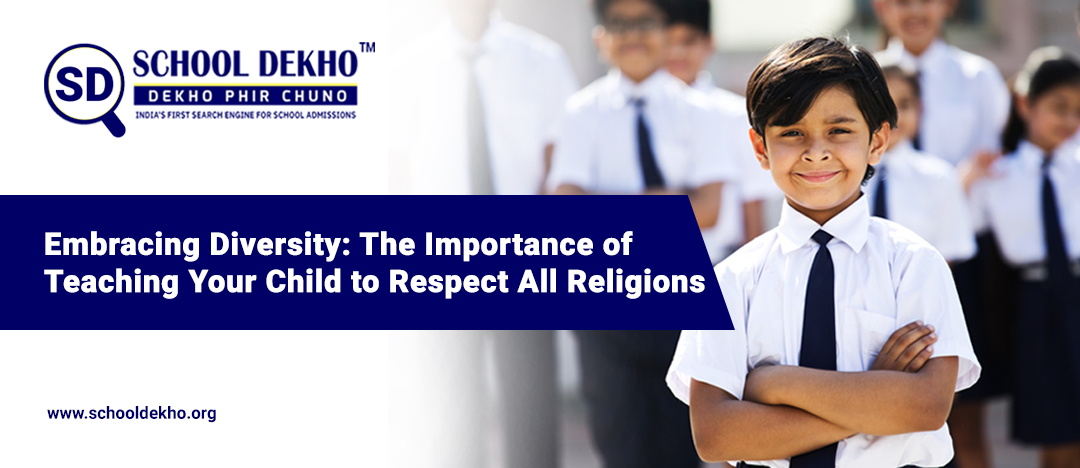
Embracing Diversity: The Importance of Teaching Your Child to Respect All Religions
In an increasingly interconnected world, the significance of teaching children to respect all religions cannot be overstated. Religion is a fundamental aspect of human identity, shaping beliefs, values, and cultural practices. Fostering religious tolerance and understanding from an early age can pave the way for a more compassionate, harmonious, and accepting society. This article delves into the reasons why it is essential to impart respect for all religions to our children and how doing so can positively impact their lives and the world around them.
1. Fostering Cultural Sensitivity
Teaching children to respect all religions nurtures cultural sensitivity. They learn to appreciate the diverse beliefs and practices that enrich the human experience. By understanding and valuing different religious traditions, children are better equipped to navigate a multicultural world with empathy and respect for others' perspectives.
2. Building a Foundation for Acceptance
Respect for all religions lays the groundwork for accepting individuals from various faiths without prejudice or bias. In a world often plagued by religious intolerance and discrimination, instilling this value in children promotes inclusivity and helps create a more tolerant and open-minded society.
3. Promoting Peaceful Coexistence
Religious conflicts have shaped human history, causing untold suffering and division. By teaching our children to respect all religions, we contribute to the promotion of peaceful coexistence. Understanding and embracing religious diversity can lead to increased harmony and cooperation among people of different faiths.
4. Nurturing Critical Thinking
Encouraging respect for all religions encourages children to think critically and independently about their beliefs and values. It prompts them to question stereotypes and misconceptions, fostering an environment where they can engage in meaningful discussions about faith and its role in society.
5. Empowering Empathy and Compassion
Respecting all religions nurtures empathy and compassion. When children recognize the importance of faith in people's lives, they are more likely to empathize with their struggles, joys, and aspirations. This empathy translates into a greater willingness to help and support others, regardless of their religious backgrounds.
6. Strengthening Interpersonal Relationships
Religious diversity is prevalent not only on a global scale but also within local communities and schools. Teaching children to respect all religions strengthens their ability to form meaningful connections with classmates, neighbors, and friends from different faiths. This inclusivity contributes to more resilient and harmonious interpersonal relationships.
7. Fostering Global Citizenship
In a world interconnected through technology and travel, being a global citizen is increasingly important. Respecting all religions helps children become well-rounded individuals who embrace diversity and appreciate the richness of different cultures and traditions. This global perspective is crucial in promoting cooperation and understanding among nations and peoples worldwide.
How to Teach Children to Respect All Religions
1. Lead by Example
Parents and caregivers play a crucial role in shaping a child's attitudes and values. Demonstrate respect for all religions through your own actions and words. Embrace diversity and engage in interfaith dialogues that highlight the importance of mutual understanding.
2. Encourage Exploration
Allow children to explore various religious traditions. Visit places of worship, read books about different faiths, and celebrate cultural festivals to give them exposure to diverse religious practices and beliefs.
3. Promote Critical Thinking
Encourage children to ask questions about religion and faith. Engage in discussions that challenge stereotypes and promote critical thinking about religious matters.
4. Emphasize Shared Values
Highlight the common values and ethical principles shared by different religions, such as love, kindness, and compassion. Show how these shared values form the foundation of a harmonious and inclusive society.
5. Address Misconceptions
Be open to addressing misconceptions or prejudices your child may encounter or express about other religions. Provide accurate information and promote understanding rather than perpetuating stereotypes.
Conclusion
Teaching children to respect all religions is an invaluable gift we can give them and society at large. By embracing religious diversity, children grow into empathetic, open-minded individuals who celebrate differences rather than fear them. As parents and educators, we have the power to shape a future where religious tolerance and understanding lead us toward a more compassionate and united world. Let us work together to raise a generation that cherishes diversity and builds bridges of respect and acceptance among all religions.
Contact with Us
Call: 1800 - 2588 - 074
Mail: info@schooldekho.org
Student’s Best Education Portal | School Dekho | India's First School Search Engine | Best Schools Near Me | Find Schools Near Me | Dekho Phir Chuno
#dekhophirchuno







Leave your thought here
Your email address will not be published. Required fields are marked *